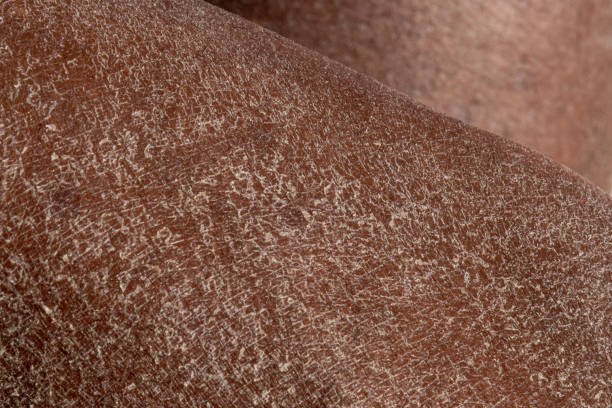
Eczema, also known as atopic dermatitis, is a common skin condition affecting millions of people worldwide, including Kenya. Its hallmark symptoms include red, itchy, and inflamed skin, which can significantly impact one’s quality of life. While there is no known cure for eczema, there are various treatment options available in Kenya that can effectively manage its symptoms and allow individuals to lead fulfilling lives. In this comprehensive guide, we will delve deeper into the causes, types, and available treatments for eczema in Kenya.
Understanding Eczema
- Types of Eczema Eczema manifests in several forms, with atopic dermatitis being the most prevalent. Other types include contact dermatitis, nummular eczema, and dyshidrotic eczema. Proper identification of the specific type of eczema is crucial as it influences treatment choices.
- Causes and Triggers The development of eczema is believed to result from a combination of genetic and environmental factors. Common triggers encompass allergens, irritants, stress, changes in weather, and certain foods. Recognizing and avoiding these triggers are key to effective eczema management.
Eczema Treatment Options in Kenya
- Topical Steroids and Non-Steroidal Creams Dermatologists in Kenya often prescribe topical steroids to reduce inflammation and alleviate itching. Non-steroidal creams, such as calcineurin inhibitors, are also available and are suitable for sensitive skin areas
- Emollients and Moisturizers Maintaining well-hydrated skin is crucial for eczema management. Emollients and moisturizers help lock in moisture and create a protective barrier on the skin, reducing dryness and preventing flare-ups.
- Antihistamines Over-the-counter and prescription antihistamines can help control itching, especially at night, which can disrupt sleep and exacerbate eczema symptoms.
- Phototherapy For severe eczema cases, phototherapy may be recommended. This treatment involves controlled exposure to ultraviolet (UV) light to reduce inflammation and itching.
- Biologic Medications Individuals with severe eczema that does not respond to other treatments may be prescribed biologic medications like Dupilumab in Kenya. These medications target specific components of the immune system involved in eczema.
- Avoiding Triggers Identifying and avoiding triggers that exacerbate eczema symptoms is essential. Dermatologists can help patients identify and effectively manage their triggers.
- Proper Skincare Practices Good skincare habits, such as taking short, lukewarm showers, using mild soap, and patting the skin dry instead of rubbing it, can significantly contribute to eczema management.
Living with Eczema in Kenya
- Diet and Eczema Some individuals with eczema experience relief by identifying and eliminating specific foods that trigger their symptoms. Consulting with a healthcare provider or allergist can help determine if dietary changes are necessary.
- Emotional Support The physical discomfort and appearance of eczema can take a toll on mental health. In Kenya, support groups and counseling services are available to help individuals cope with the emotional aspects of living with eczema.
- Alternative Therapies While not substitutes for medical treatment, some individuals in Kenya explore complementary therapies like acupuncture, herbal remedies, or meditation to manage stress and potentially reduce eczema symptoms.
Preventing Eczema Flare-ups
- Environmental Control Implementing measures to reduce exposure to common triggers, such as dust mites, pet dander, and certain fabrics, can effectively prevent eczema flare-ups.
- Stress Management Stress is a known trigger for eczema. Practising stress-reduction techniques like yoga, meditation, or mindfulness can be beneficial for managing the condition.
- Regular Follow-ups Individuals with eczema in Kenya should schedule regular follow-up appointments with dermatologists or healthcare providers to monitor their condition and adjust treatment plans as needed.
Conclusion
Eczema is a persistent skin condition that requires careful management to ensure a good quality of life for affected individuals. In Kenya, a variety of treatment options and resources are available to help those living with eczema navigate this challenging condition.
One notable institution at the forefront of eczema treatment in Kenya is Afyacore Skin and Laser Clinic. This state-of-the-art clinic has earned a reputation for excellence in dermatological care, and it plays a pivotal role in addressing eczema-related concerns in the country.
Afyacore Skin and Laser Clinic offers a comprehensive range of eczema treatment options, including topical steroids, non-steroidal creams, emollients, and moisturizers. Their team of experienced dermatologists is well-equipped to diagnose the specific type of eczema an individual is dealing with and tailor a treatment plan accordingly.
For more severe cases, Afyacore Skin and Laser Clinic provides advanced treatments such as phototherapy and biologic medications like Dupilumab. These cutting-edge therapies target the root causes of eczema, offering hope and relief to individuals who have struggled with the condition for years.
Moreover, Afyacore Skin and Laser Clinic places a strong emphasis on patient education and support. They work closely with patients to help them identify and manage triggers, develop proper skincare practices, and provide emotional support to cope with the challenges that eczema can present.
In conclusion, eczema treatment in Kenya has made significant strides, thanks to institutions like Afyacore Skin and Laser Clinic. With a multidimensional approach to care that includes state-of-the-art treatments, patient education, and emotional support, Afyacore Skin and Laser Clinic stands as a beacon of hope for individuals living with eczema in Kenya. If you or a loved one is seeking effective eczema treatment, consider reaching out to Afyacore Skin and Laser Clinic to embark on a path toward healthier, happier skin. Remember, eczema can be managed, and with the right support, you can thrive despite its challenges.

